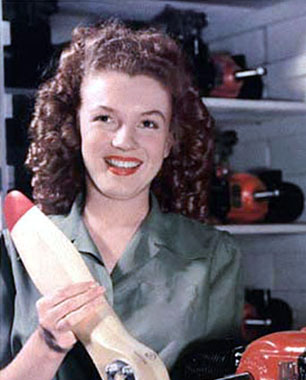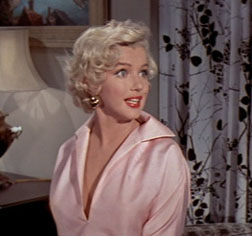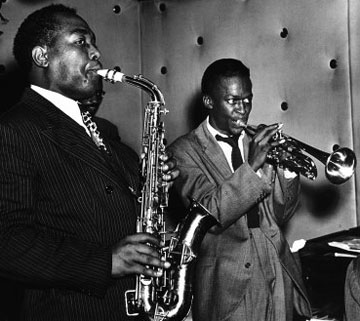Marilyn Monroe NOT a communist for the FBI .. just smarter than Hollywood wanted her to be
Jan 1st, 2013 | By L. Frank Bunting | Category: USA TodayOne of the many intriguing things about the year which has just ended is that it marked the 50th anniversary of the death of Marilyn Monroe, in the Brentwood neighbourhood of Los Angeles (more or less due north of Santa Monica), on August 5, 1962.
Adding somewhat to this intrigue, in the no-man’s-land days between Christmas and New Years 2012 : ”FBI files on Marilyn Monroe that could not be located earlier this year” were “found and re-issued, revealing the names of some of the movie star’s communist-leaning friends who drew concern from government officials and her own entourage.”
According to Frederick Vanderbilt Field, who was “disinherited from his wealthy family over his leftist views,” some five months or so before Ms Monroe (as the official theory still has it) committed suicide via an overdose of barbiturates, she “told us about her strong feelings for civil rights, for black equality, as well as her admiration for what was being done in China, her anger at red-baiting and McCarthyism and her hatred of (FBI director) J. Edgar Hoover.”
The FBI itself finally came to somewhat similar views, while conceding that, whatever else she may or may not have been, Marilyn Monroe was not a communist for the FBI or anyone or anything else: “‘Subject’s views are very positively and concisely leftist; however, if she is being actively used by the Communist Party, it is not general knowledge among those working with the movement in Los Angeles,’ a July 1962 entry in Monroe’s file says.”
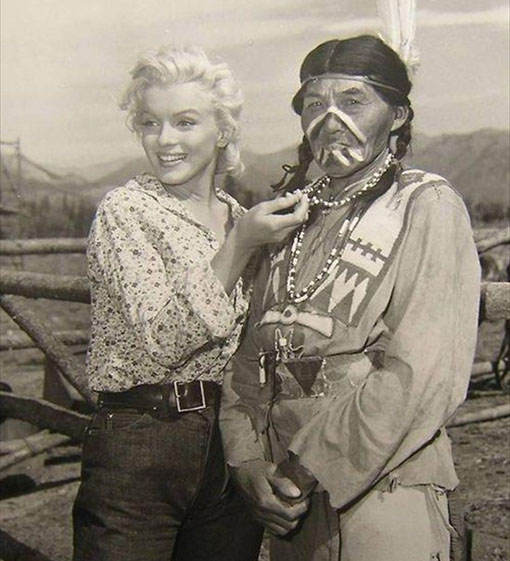
Marilyn with representative First American – from the website, If Charlie Parker Was a Gunslinger, There’d Be a Whole Lot of Dead Copycats.
Accidentally or otherwise, ending 2012 (and/or starting 2013) with a brief nod to the movie star and tragic cultural icon Marilyn Monroe (aka Norma Jeane Mortenson, or Norma Jeane Baker, etc, etc) seems especially apt. Whether she quite knew it or not, she was an early apostle of the United States of America that the re-elected President Barack Obama has at last cunningly brought onto the main stage of American history.
(Which is of course not at all to say that he really is a socialist, or anything remotely like that – or anything that is not essentially American, but somehow “European,” as his worst know-nothing critics like to pretend. The crucial point is much closer to what Time Editor Rick Stengel recently told NBC’s ‘Today’ show :“We are in the midst of historic cultural and demographic changes, and Obama is both the symbol and in some ways the architect of this new America.”)
* * * *
In some interesting but not often commented-on ways, the American actress and movie star Marilyn Monroe bears at least some comparison with the great American guru of modern jazz, Charlie Parker.
He was born six years before her (1920 compared with her 1926), and died seven years before she died (1955 rather than 1962). And Charlie Parker has never been at all as famous as Marilyn Monroe. (His star disciple Miles Davis, who was born in 1926, just like Ms Monroe, and lived almost twice as long as both her and Charlie Parker, came closer to matching her fame, but of course no jazz musician could ever quite do that. Even today, no doubt, many people who have heard of Marilyn Monroe have no idea who either Miles Davis or Charlie Parker were or are – in the deeper annals of American culture!)
You might also say that Charlie Parker’s contribution to the one unique American art form was considerably more serious – more weighty and full of what the late William Buckely used to call gravitas – than Marilyn Monroe’s contribution to the other unique American art form.
But the more I think about it myself, the more I wonder whether this doesn’t seriously short change Ms. Monroe. (In 1951, eg, “Monroe enrolled at University of California, Los Angeles, where she studied literature and art appreciation.” She almost certainly never practised 11 to 15 hours a day in her youth – as Charlie Parker did in his conquest of the alto saxophone. And she probably didn’t have his very powerful raw intelligence. But it does seem clear enough that she was a much smarter and even more intellectual lady than Hollywood wanted her to be.)
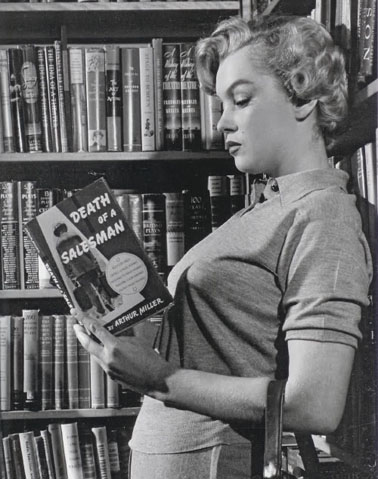
Marilyn reading – from the website, If Charlie Parker Was a Gunslinger, There’d Be a Whole Lot of Dead Copycats.
In any case, there remain some intriguing similarities. Both Charlie Parker and Marilyn Monroe made their reputations in the years immediately following the Second World War – the last half of the 1940s and first half of the 1950s, as it were. In somewhat different ways their brief but brilliant lives have left big legacies for the new America of the early 21st century, of which Barack Obama is “in some ways the architect.”
The Jack Kerouac who wrote On the Road (the latest movie of which, with Kristen Stewart, also appeared in 2012) was the first great poet of Charlie Parker’s America. And both Marilyn Monroe’s sometime husband Arthur Miller, and her most intellectual biographer Norman Mailer, have helped add some kind of appropriate weight and heft to her later legend.
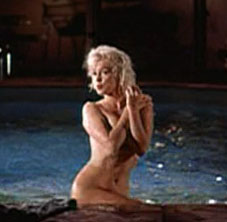
Marilyn Monroe in her last and (for her) never quite completed movie, Something’s Got To Give, 1962.
You pay an enormous price for achieving the kind of legendary and/or iconic cultural status that the ghosts of Marilyn Monroe and Charlie Parker have, in rather different ways, come to enjoy. They both lived tormented lives, in the midst of much brilliance, and died in their mid 30s, more or less at their own hands.
Finally, you don’t often see a lot of comparative thinking and writing and so forth about Charlie Parker and Marilyn Monroe as birds of some new early 21st century American feather, and so forth. But it is no accident, I think myself, that some of the most interesting photographs of Ms Monroe on the net today appear in a “Marilyn in Action” section, on a website called “If Charlie Parker Was a Gunslinger, There’d Be a Whole Lot of Dead Copycats.” And I at least want to recommend this section of this site to anyone who might be listening, as I also (somewhat grandiloquently no doubt) wish the entire new human universe a very Happy New Year 2013 – a time which holds out many beguiling fresh prospects of many interesting new things.
